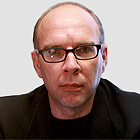Talk by Shri Ajit Kumar Doval
'People will forgive you for being wrong, but they will never forgive you for being right - especially if events prove you right while proving them wrong.' Thomas Sowell
Search This Blog
Showing posts with label NSA. Show all posts
Showing posts with label NSA. Show all posts
Saturday, 10 January 2015
Wednesday, 11 September 2013
The NSA's next move: silencing university professors?
A Johns Hopkins computer science professor blogs on the NSA and is asked to take it down. I fear for academic freedom
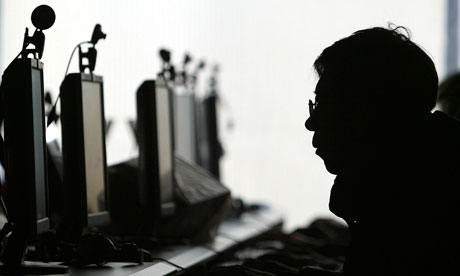
On 9 September, Johns Hopkins University asked one of its professors to take down a blog post on the NSA. Photograph: AP
This actually happened yesterday:
A professor in the computer science department at Johns Hopkins, a leading American university, had written a post on his blog, hosted on the university's servers, focused on his area of expertise, which is cryptography. The post was highly critical of the government, specifically the National Security Agency, whose reckless behavior in attacking online security astonished him.
Professor Matthew Green wrote on 5 September:
I was totally unprepared for today's bombshell revelations describing the NSA's efforts to defeat encryption. Not only does the worst possible hypothetical I discussed appear to be true, but it's true on a scale I couldn't even imagine.
The post was widely circulated online because it is about the sense of betrayal within a community of technical people who had often collaborated with the government. (I linked to it myself.)
On Monday, he gets a note from the acting dean of the engineering school asking him to take the post down and stop using the NSA logo as clip art in his posts. The email also informs him that if he resists he will need a lawyer. The professor runs two versions of the same site: one hosted on the university's servers, one on Google's blogger.com service. He tells the dean that he will take down the site mirrored on the university's system but not the one on blogger.com. He also removes the NSA logo from the post. Then, he takes to Twitter.
The professor says he was told that someone at the Applied Physics Laboratory, a research institute with longstanding ties to the Department of Defense and the National Security Agency, determined that his blog post was hosting or linking to classified material, and sounded the alarm, which led to the takedown request from the dean. He says he thought Johns Hopkins University, his employer, had come down "on the wrong side of common sense and academic freedom", particularly since the only classified material he had linked to was from news reports in the Guardian, the New York Times and ProPublica.org – information available to the public.
Word gets around, and by late afternoon, the press starts asking questions. Now, Johns Hopkins is worried about how it looks in the media. The university bureaucracy scrambles the jets and comes up with a statement:
The university received information this morning that Matthew Green's blog contained a link or links to classified material and also used the NSA logo. For that reason, we asked professor Green to remove the Johns Hopkins-hosted mirror site for his blog Upon further review, we note that the NSA logo has been removed and that he appears to link to material that has been published in the news media. Interim Dean Andrew Douglas has informed professor Green that the mirror site may be restored.
So the university backs down, leaving many unanswered questions. Possibly, they will be addressed today. Here are some on my list:
Who was it in the Applied Physics Laboratory, with its close ties to the NSA, that raised the alarm about what a (very effective) critic of the NSA was writing ... and why?
Did that person hear first from the government and then contact the Johns Hopkins officials?
Why would an academic dean cave under pressure and send the takedown request without careful review, which would have easily discovered, for example, that the classified documents to which the blog post linked were widely available in the public domain?
Why is Johns Hopkins simultaneously saying that the event was internal to the university (that the request didn't come from the government) and that it doesn't know how the whole thing began? The dean of the engineering school doesn't know who contacted him about a professor's blog post? Really? The press office doesn't know how to get in touch with the dean? Seems unlikely. Johns Hopkins spokesman Dennis O'Shea told me this morning that university officials "were still trying to trace" the events back to their source. Clearly, there's a lot more to the story.
Matthew Green said the original request to take down his post could have referred to his Blogger.com site and the site hosted on Johns Hopkins servers. Since a request to unpublish your thoughts is one of the most extreme and threatening that any university can make of a faculty member, what kind of deliberation went into it? That Johns Hopkins backtracked so quickly after the press started asking questions suggests that the reasoning was pretty thin. But the request was momentous. These things don't fit together. What gives?
Dennis O'Shea told me the original concern was that Matthew Green's post might be "illegally linking to classified information". I asked him what law he was referring to. "I'm not saying that there was a great deal of legal analysis done," he replied. Obviously. But again: given the severity of the remedy – unpublishing an expert's post critical of theNSA – careful legal analysis was called for. Why was it missing?
In commenting critically on a subject he is expert in, and taking an independent stance that asks hard questions and puts the responsibility where it belongs, Matthew Green is doing exactly what a university faculty member is supposed to be doing. By putting his thoughts in a blog post that anyone can read and link to, he is contributing to a vital public debate, which is exactly what universities need to be doing more often. Instead of trying to get Matthew Green's blog off their servers, the deans should be trying to get more faculty into blogging and into the public arena. Who at Johns Hopkins is speaking up for these priorities? And why isn't the Johns Hopkins faculty roaring about this issue? (I teach at New York University, and I'm furious.)
Notice: Matthew Green didn't get any takedown request from Google. Only from Johns Hopkins. Think about what that means for the school. He's "their" professor, yet his work is safer on the servers of a private company than his own university. The institution failed in the clutch. That it rectified it later in the day is welcome news, but I won't be cheering until we have answers that befit a great institution like Johns Hopkins, where graduate education was founded on these shores.
And another thing: America's system of research universities is the best in the world. No one argues with that. It's one of biggest advantages this nation has. If it becomes captive to government and handmaiden to the surveillance state, that would be an economic and cultural crime of monstrous proportions. What happened to Matthew Green's blog post yesterday is no small matter.
Wednesday, 21 August 2013
So the innocent have nothing to fear?
After David Miranda we now know where this leads
The destructive power of state snooping is on display for all to see. The press must not yield to this intimidation
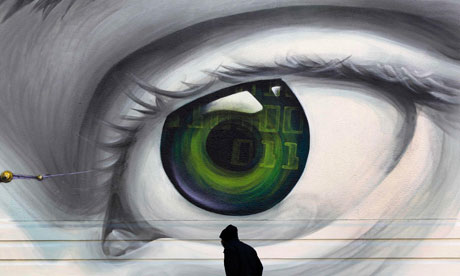
'But it remains worrying that many otherwise liberal-minded Britons seem reluctant to take seriously the abuses revealed in the nature and growth of state surveillance.' Photograph: Yannis Behrakis/Reuters
You've had your fun: now we want the stuff back. With these words the British government embarked on the most bizarre act of state censorship of the internet age. In a Guardian basement, officials from GCHQ gazed with satisfaction on a pile of mangled hard drives like so many book burners sent by the Spanish Inquisition. They were unmoved by the fact that copies of the drives were lodged round the globe. They wanted their symbolic auto-da-fe. Had the Guardian refused this ritual they said they would have obtained a search and destroy order from a compliant British court.
Two great forces are now in fierce but unresolved contention. The material revealed by Edward Snowden through the Guardian and the Washington Post is of a wholly different order from WikiLeaks and other recent whistle-blowing incidents. It indicates not just that the modern state is gathering, storing and processing for its own ends electronic communication from around the world; far more serious, it reveals that this power has so corrupted those wielding it as to put them beyond effective democratic control. It was not the scope of NSA surveillance that led to Snowden's defection. It was hearing his boss lie to Congress about it for hours on end.
Last week in Washington, Congressional investigators discovered that the America's foreign intelligence surveillance court, a body set up specifically to oversee the NSA, had itself been defied by the agency "thousands of times". It was victim to "a culture of misinformation" as orders to destroy intercepts, emails and files were simply disregarded; an intelligence community that seems neither intelligent nor a community commanding a global empire that could suborn the world's largest corporations, draw up targets for drone assassination, blackmail US Muslims into becoming spies and haul passengers off planes.
Yet like all empires, this one has bred its own antibodies. The American (or Anglo-American?) surveillance industry has grown so big by exploiting laws to combat terrorism that it is as impossible to manage internally as it is to control externally. It cannot sustain its own security. Some two million people were reported to have had access to the WikiLeaks material disseminated by Bradley Manning from his Baghdad cell. Snowden himself was a mere employee of a subcontractor to the NSA, yet had full access to its data. The thousands, millions, billions of messages now being devoured daily by US data storage centres may be beyond the dreams of Space Odyssey's HAL 9000. But even HAL proved vulnerable to human morality. Manning and Snowden cannot have been the only US officials to have pondered blowing a whistle on data abuse. There must be hundreds more waiting in the wings – and always will be.
There is clearly a case for prior censorship of some matters of national security. A state secret once revealed cannot be later rectified by a mere denial. Yet the parliamentary and legal institutions for deciding these secrets are plainly no longer fit for purpose. They are treated by the services they supposedly supervise with falsehoods and contempt. In America, the constitution protects the press from pre-publication censorship, leaving those who reveal state secrets to the mercy of the courts and the judgment of public debate – hence the Putinesque treatment of Manning and Snowden. But at least Congress has put the US director of national intelligence, James Clapper, under severe pressure. Even President Barack Obama has welcomed the debate and accepted that the Patriot Act may need revision.
In Britain, there has been no such response. GCHQ could boast to its American counterpart of its "light oversight regime compared to the US". Parliamentary and legal control is a charade, a patsy of the secrecy lobby. The press, normally robust in its treatment of politicians, seems cowed by a regime of informal notification of "defence sensitivity". This D-Notice system used to be confined to cases where the police felt lives to be at risk in current operations. In the case of Snowden the D-Notice has been used to warn editors off publishing material potentially embarrassing to politicians and the security services under the spurious claim that it "might give comfort to terrorists".
Most of the British press (though not the BBC, to its credit) has clearly felt inhibited. As with the "deterrent" smashing of Guardian hard drives and the harassing of David Miranda at Heathrow, a regime of prior restraint has been instigated in Britain whose apparent purpose seems to be simply to show off the security services as macho to their American friends.
Those who question the primacy of the "mainstream" media in the digital age should note that it has been two traditional newspapers, in London and Washington, that have researched, co-ordinated and edited the Snowden revelations. They have even held back material that the NSA and GCHQ had proved unable to protect. No blog, Twitter or Facebook campaign has the resources or the clout to confront the power of the state.
There is no conceivable way copies of the Snowden revelations seized this week at Heathrow could aid terrorism or "threaten the security of the British state" – as charged today by Mark Pritchard, an MP on the parliamentary committee on national security strategy. When the supposed monitors of the secret services merely parrot their jargon against press freedom, we should know this regime is not up to its job.
The war between state power and those holding it to account needs constant refreshment. As Snowden shows, the whistleblowers and hacktivists can win the occasional skirmish. But it remains worrying that many otherwise liberal-minded Britons seem reluctant to take seriously the abuses revealed in the nature and growth of state surveillance. The arrogance of this abuse is now widespread. The same police force that harassed Miranda for nine hours at Heathrow is the one recently revealed as using surveillance to blackmail Lawrence family supporters and draw up lists of trouble-makers to hand over to private contractors. We can see where this leads.
I hesitate to draw parallels with history, but I wonder how those now running the surveillance state – and their appeasers – would have behaved under the totalitarian regimes of the 20th century. We hear today so many phrases we have heard before. The innocent have nothing to fear. Our critics merely comfort the enemy. You cannot be too safe. Loyalty is all. As one official said in wielding his legal stick over the Guardian: "You have had your debate. There's no need to write any more."
Yes, there bloody well is.
Wednesday, 7 August 2013
The US frequently refuses extradition requests - On Obama's cancellation of summit with Putin and extradition
The US frequently refuses extradition requests where, unlike with Snowden, it involves serious crimes and there is an extradition treaty
BETA
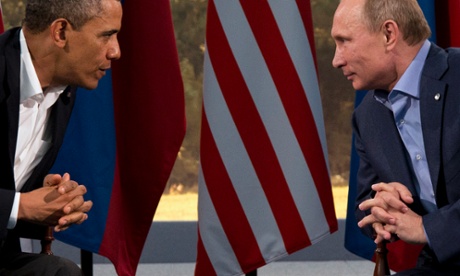
President Barack Obama today canceled a meeting with Russian President Vladimir Putin. Photograph: Evan Vucci/AP
President Obama today canceled a long-scheduled summit with Russian PresidentVladimir Putin in part because the US president is upset that Russia defied his personal directive to hand over Edward Snowden despite the lack of an extradition treaty between the two nations. That means that US media outlets will spend the next 24 hours or so channeling the government's views (excuse the redundancy) by denouncing the Russian evil of refusing extradition. When doing so, very few, if any, establishment media accounts will mention any of these cases:

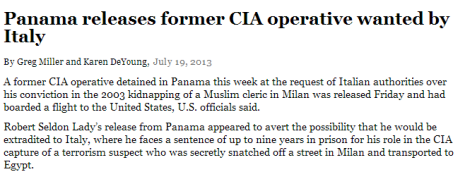

[US refuses Bolivia's request to extradite its former CIA-supported president, Gonzalo Sánchez de Lozada, to stand trial on charges of genocide and other war crimes after de Lozada hires Democratic lobbyists to represent him]
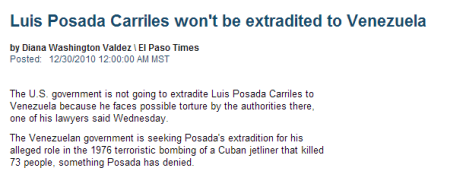
The US constantly refuses requests to extradite - even where (unlike Russia) they have an extradition treaty with the requesting country and even where (unlike Snowden) the request involves actual, serious crimes, such as genocide, kidnapping, and terrorism. Maybe those facts should be part of whatever media commentary there is on Putin's refusal to extradite Snowden and Obama's rather extreme reaction to it.
Other matters
Former Bush-era CIA and NSA director Michael Hayden appeared on CNN this week and confirmed that our reporting on the NSA's X-Keyscore program was accurate, telling the nation that we should all be grateful for those capabilities.
NYU journalism professor Jay Rosen has a superb essay on the behavior of the US media in NSA stories.
Foreign Policy CEO and Editor David Rothkopf becomes the latest establishment figure to recognize, as he puts it in a quite good column: "I have myself been too slow to recognize that the benefits we have derived from Snowden's revelations substantially outweigh the costs associated with the breach."
Wednesday, 3 July 2013
NSA spying revelations: why so many are keen to play down the debate
The mass surveillance that Edward Snowden has exposed asks questions not only of government but of telecoms companies too
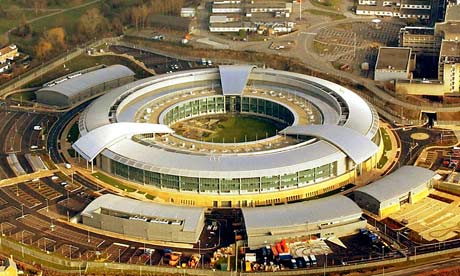
GCHQ reportedly snooped on foreign politicians attending two G20 summit meetings in London in 2009. Photograph: Barry Batchelor/PA
Covering the Edward Snowden story has not been straightforward for many in the mainstream media, which is reflected in the disjointed coverage it has received in the UK so far. For the newspapers that campaigned so hard to get the communications data bill thrown out because of the implications for privacy, he should be a hero. But then the brash young American "stole" the material, came to the Guardian with it, and has ended up stranded in Russia, where he may or may not receive asylum with the help of Julian Assange. All of which makes him rather unpalatable to many in Fleet Street – and indeed the House of Commons. For many of them, the easier story to tell was the one about Snowden's girlfriend, who was left bereft in Hawaii.
This week there have been more revelations about the way the US spied on the EU, which followed the Guardian's disclosures about how the British snooped on diplomats from Turkey and South Africa, among others, at the G20 summit in London four years ago. This has caused genuine fury among those targeted, particularly the Germans and the French. But their anger has been met with shoulder-shrugging indignation from former British diplomats and security experts, who say this sort of thing happens all the time.
They would hardly say anything different. In all likelihood, they have either authorised or benefited from such covert intelligence gathering, so the lack of biting analysis was entirely predictable. For those in the media unsure how to deal with Snowden, and rather hoping the complex saga would go away, this was another easy escape route: "No story here, let's move on."
But there is a story. It gets lost, all too conveniently, in the diplomatic rows and the character-assassinations, but ultimately it is the legacy of the Snowden files. The documents have shown that intelligence agencies in the UK and the US are harvesting vast amounts of information about millions of people. This is fact, not fantasy. They are doing this right now, on a scale that could not have been envisaged five years ago, let alone when the laws covering the collection and retention of data were drafted. They are also sharing this treasure trove of intelligence with each other, and other close allies.
In the UK, the same ministers who sign off operations to spy on our allies, are also approving countless warrants to allow GCHQ to siphon off data from cables that carry internet traffic in and out of the country. Emails, conversations on Skype, the details of phone calls – they all go into the intelligence pot ready for analysis and digestion.
The methods that GCHQ has developed may be ingenious. But are they right? Do the laws really legitimise this activity? And can the handful of MPs and commissioners tasked with the scrutinising the agencies really keep on top of all this? Do they have the staff, the expertise? Those are the questions that need proper argument. The reassurances of senior cabinet ministers, such as William Hague, who is responsible for GCHQ, needed to be tested, not just repeated unchallenged.
Those who wail about the leaks affecting national security might consider the words of Bruce Schneier, a security specialist, who wrote in the New York Times: "The argument that exposing these documents helps the terrorists doesn't even pass the laugh test; there's nothing here that changes anything any potential terrorist would do or not do."
And where are the telecoms companies in all this, and the internet service providers? For now, they are still keeping quiet. But at some point they will be asked to explain to their millions of customers what they knew about this industrial-scale snooping. None of this is easy, and ministers and intelligence officials would like nothing more than to shut down the debate. The clues are in their discomfort.
Monday, 10 June 2013
NSA whistleblower Edward Snowden: 'I do not expect to see home again'
Source for the Guardian's NSA files on why he carried out the biggest intelligence leak in a generation – and what comes next
Edward Snowden was interviewed over several days in Hong Kong by Glenn Greenwald and Ewen MacAskill.
Q: Why did you decide to become a whistleblower?
A: "The NSA has built an infrastructure that allows it to intercept almost everything. With this capability, the vast majority of human communications are automatically ingested without targeting. If I wanted to see your emails or your wife's phone, all I have to do is use intercepts. I can get your emails, passwords, phone records, credit cards.
"I don't want to live in a society that does these sort of things … I do not want to live in a world where everything I do and say is recorded. That is not something I am willing to support or live under."
Q: But isn't there a need for surveillance to try to reduce the chances of terrorist attacks such as Boston?
A: "We have to decide why terrorism is a new threat. There has always been terrorism. Boston was a criminal act. It was not about surveillance but good, old-fashioned police work. The police are very good at what they do."
Q: Do you see yourself as another Bradley Manning?
A: "Manning was a classic whistleblower. He was inspired by the public good."
Q: Do you think what you have done is a crime?
A: "We have seen enough criminality on the part of government. It is hypocritical to make this allegation against me. They have narrowed the public sphere of influence."
Q: What do you think is going to happen to you?
A: "Nothing good."
Q: Why Hong Kong?
A: "I think it is really tragic that an American has to move to a place that has a reputation for less freedom. Still, Hong Kong has a reputation for freedom in spite of the People's Republic of China. It has a strong tradition of free speech."
Q: What do the leaked documents reveal?
A: "That the NSA routinely lies in response to congressional inquiries about the scope of surveillance in America. I believe that when [senator Ron] Wyden and [senator Mark] Udall asked about the scale of this, they [the NSA] said it did not have the tools to provide an answer. We do have the tools and I have maps showing where people have been scrutinised most. We collect more digital communications from America than we do from the Russians."
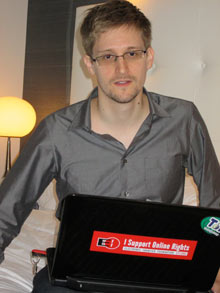 Snowden is a 29-year-old former technical assistant for the CIA
Snowden is a 29-year-old former technical assistant for the CIA
Q: What about the Obama administration's protests about hacking by China?
A: "We hack everyone everywhere. We like to make a distinction between us and the others. But we are in almost every country in the world. We are not at war with these countries."
Q: Is it possible to put security in place to protect against state surveillance?
A: "You are not even aware of what is possible. The extent of their capabilities is horrifying. We can plant bugs in machines. Once you go on the network, I can identify your machine. You will never be safe whatever protections you put in place."
Q: Does your family know you are planning this?
A: "No. My family does not know what is happening … My primary fear is that they will come after my family, my friends, my partner. Anyone I have a relationship with …
I will have to live with that for the rest of my life. I am not going to be able to communicate with them. They [the authorities] will act aggressively against anyone who has known me. That keeps me up at night."
Q: When did you decide to leak the documents?
A: "You see things that may be disturbing. When you see everything you realise that some of these things are abusive. The awareness of wrong-doing builds up. There was not one morning when I woke up [and decided this is it]. It was a natural process.
"A lot of people in 2008 voted for Obama. I did not vote for him. I voted for a third party. But I believed in Obama's promises. I was going to disclose it [but waited because of his election]. He continued with the policies of his predecessor."
Q: What is your reaction to Obama denouncing the leaks on Friday while welcoming a debate on the balance between security and openness?
A: "My immediate reaction was he was having difficulty in defending it himself. He was trying to defend the unjustifiable and he knew it."
Q: What about the response in general to the disclosures?
A: "I have been surprised and pleased to see the public has reacted so strongly in defence of these rights that are being suppressed in the name of security. It is not like Occupy Wall Street but there is a grassroots movement to take to the streets on July 4 in defence of the Fourth Amendment called Restore The Fourth Amendment and it grew out of Reddit. The response over the internet has been huge and supportive."
Q: Washington-based foreign affairs analyst Steve Clemons said he overheard at the capital's Dulles airport four men discussing an intelligence conference they had just attended. Speaking about the leaks, one of them said, according to Clemons, that both the reporter and leaker should be "disappeared". How do you feel about that?
A: "Someone responding to the story said 'real spies do not speak like that'. Well, I am a spy and that is how they talk. Whenever we had a debate in the office on how to handle crimes, they do not defend due process – they defend decisive action. They say it is better to kick someone out of a plane than let these people have a day in court. It is an authoritarian mindset in general."
Q: Do you have a plan in place?
A: "The only thing I can do is sit here and hope the Hong Kong government does not deport me … My predisposition is to seek asylum in a country with shared values. The nation that most encompasses this is Iceland. They stood up for people over internet freedom. I have no idea what my future is going to be.
"They could put out an Interpol note. But I don't think I have committed a crime outside the domain of the US. I think it will be clearly shown to be political in nature."
Q: Do you think you are probably going to end up in prison?
A: "I could not do this without accepting the risk of prison. You can't come up against the world's most powerful intelligence agencies and not accept the risk. If they want to get you, over time they will."
Q: How to you feel now, almost a week after the first leak?
A: "I think the sense of outrage that has been expressed is justified. It has given me hope that, no matter what happens to me, the outcome will be positive for America. I do not expect to see home again, though that is what I want."
Subscribe to:
Comments (Atom)
